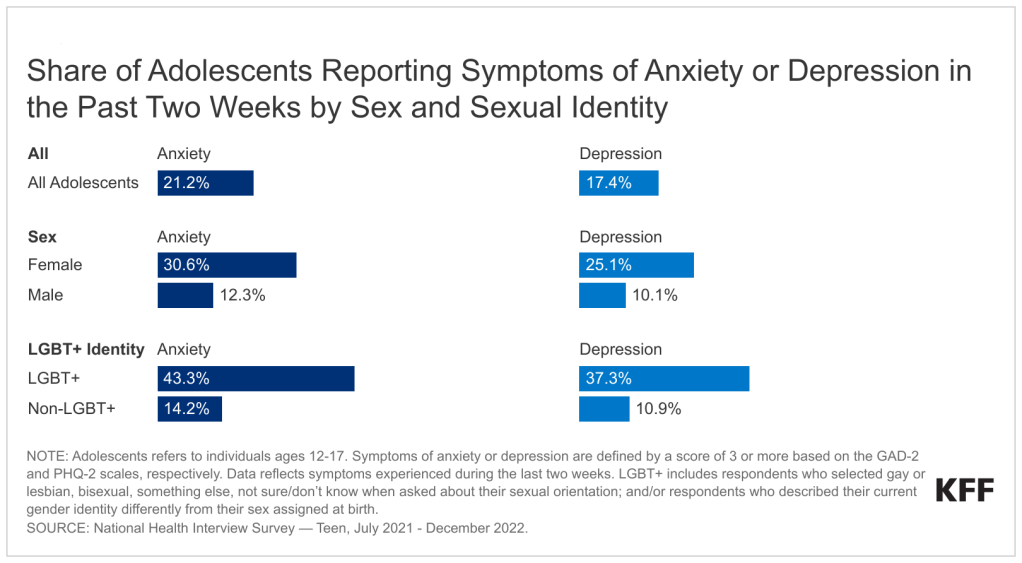
The independent source for health policy research, polling, and news.
Roughly 1 in 5 Adolescents Report Experiencing Symptoms of Anxiety or Depression
Although Some Are Getting Mental Health Care, Many Teenagers Say They Are Not Receiving the Therapy They Need
About 1 in 5 adolescents report symptoms of anxiety or depression, according to a KFF analysis of a new federal survey of teen health.
While some teens are getting mental health care, a significant share say they are not receiving the therapy they need due to costs, fear of what others will think, and/or not knowing how to get help.
Data from the recently released Teen National Health Interview Survey from July 2021 to December 2022, reveals that 21% of adolescents ages 12-17 report experiencing symptoms of anxiety in the past two weeks, and 17% said they had symptoms of depression.
Female adolescents were more than twice as likely as their male peers to report feelings of anxiety (31% vs. 12%) and depression (25% vs. 10%) during the survey period. Rates were highest among LGBT+ adolescents, with 43%reporting symptoms of anxiety and 37% saying they had symptoms of depression.
The results of the survey — unique in that they represent direct responses from adolescents themselves, rather than from their parents or guardians – come at a time of heightened concern about the state of American teenagers’ mental health.

The analysis also examines data on the rates of adolescent drug overdoses, suicide and self-harm, by race/ethnicity and sex. It also examines access to therapy and the share of adolescents who report negative experiences, such as bullying.
While studies have documented rising mental health problems among adolescents in the U.S. for years, the trend was exacerbated by the COVID-19 pandemic. Since 2021, the U.S. Surgeon General has twice issued advisories about the challenges to youth mental health, including the threat posed by excessive social media use.
Among the other key takeaways from KFF’s analysis:
- Although some adolescents received mental health care, 20% reported not receiving the mental health therapy they needed because of cost, fear of what others would think, and/or because they didn’t know how to get help. This lack of needed therapy or counseling was more pronounced among female (32%) and LGBT+ adolescents (38%).
- Deaths due to drug overdose among adolescents have more than doubled in recent years — fueled by the rise of the synthetic opioid fentanyl — increasing from 253 deaths in 2018 to 722 deaths in 2022. The largest increases in these overdose deaths were among Hispanic and Black adolescents.
- Ninety-two percent of adolescents reported at least two hours of weekday screen time not associated with schoolwork. Research has found that social media use may be associated with poor well-being among youth, with a higher risk of depression for female adolescents.
- Many adolescents reported enduring negative experiences such as bullying (34%), emotional abuse by a parent (17%), and neighborhood violence (15%) in 2021 and 2022, all of which can influence mental health.
The full analysis, Recent Trends in Mental Health and Substance use Concerns Among Adolescents, is available here.
Also recently released by KFF are two related analyses: One takes stock of the latest efforts in the states to combat the opioid epidemic and another describes the supply and characteristics of substance use and mental health treatment facilities across the U.S.
- As Congress discusses reauthorizing the expired 2018 SUPPORT Act, state Medicaid programs are taking active steps to address the opioid epidemic. State Medicaid efforts include improving access to OUD treatment medications, covering over the counter Narcan, and extending OUD treatment to soon-to-be-released inmates–a population at high risk of overdose death upon release.
- Low treatment rates for substance use and mental health conditions may be due, in part, to limited treatment options and workforce shortages. In the U.S., there are about 14,700 substance use and 9,500 mental health treatment facilities. Most offer outpatient services, while fewer offer more intensive inpatient or residential care. Facility ownership and insurance participation vary—with private ownership more common in substance use treatment and notable state-by-state variation in many areas.